In this article:
Gallstones produce symptoms in some people, but they can last for years without causing any symptoms in many.
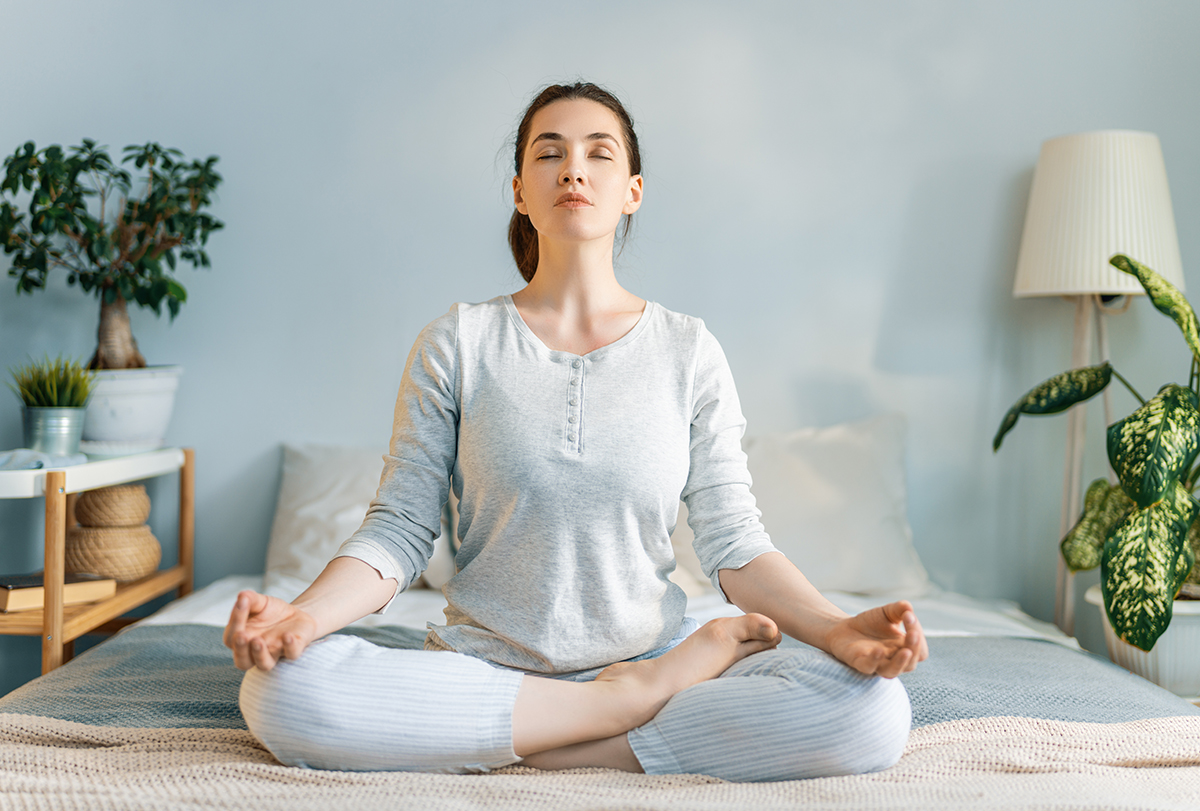
These gallstones may move around in the gallbladder and pass into the duct that leads out of it, causing sudden abdominal pain and cramps along with other discomforting symptoms such as flatulence, bloating, nausea, reduced appetite, and weight loss. These symptoms may subside as the stone moves out of the bile duct, but if it gets trapped inside it, you will experience severe abdominal pain that can persist for hours.
It is a serious condition that can result in life-threatening complications if left untreated. So, it is important to seek proper medical treatment if you develop any of the characteristic symptoms of gallstones to keep your condition from worsening.
Many home remedies have become popular as a natural cure for gallstones, but there is little to no scientific support for such claims. Most of these employ certain natural ingredients that may help prevent the formation of gallstones but are rather ineffective in dissolving or expelling the ones that are already formed.
Home remedies may help alleviate some of your symptoms while also improving your overall gallbladder and liver function. So, there is no harm in trying these remedies as an adjunct to your prescribed medical treatment but only after checking with your doctor.
Home Remedies for Gallstones
Here are some home remedies that may help treat and manage gallstones and their symptoms.
1. Drink plenty of fluids
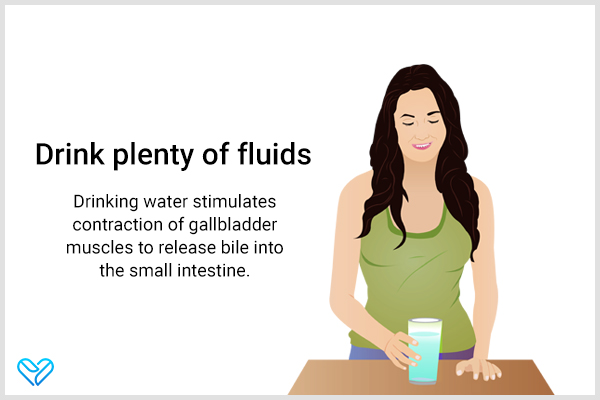
Drinking water stimulates the contraction of the gallbladder muscles to release bile into the small intestine.
Thus, increasing your water consumption throughout the day can help trigger frequent gallbladder contractions so that it empties properly. This not only helps expel small stones from the gallbladder but also prevents new stones from forming.
Conversely, not drinking enough water can dehydrate the body, which can contribute to gallstone formation. (1)
In one study, consumption of 400 mL of water led to gallbladder contraction and ejection of its contents in healthy subjects.
2. Drink lemon juice
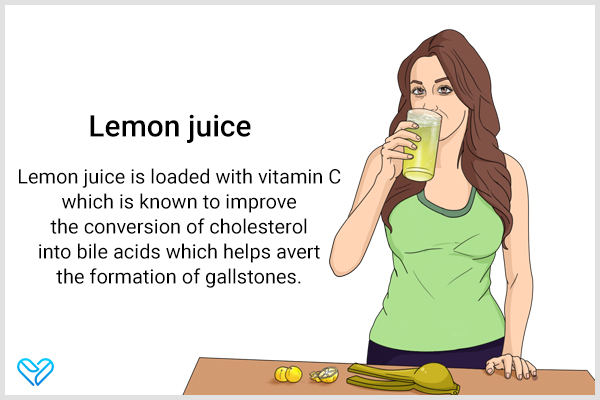
Lemon juice is loaded with vitamin C, which is known to improve the conversion of cholesterol into bile acids, which helps avert the formation of gallstones.
Research has linked regular intake of vitamin C supplements with a reduced risk of gallstones. (2)
One study showed that adding fresh lemon juice to the regular diet may help prevent gallstone recurrence in patients with calcium-oxalate nephrolithiasis. (3)
How to use:
- Squeeze the juice of one lemon in a glass of water and mix well.
- Drink this solution daily until your condition improves.
3. Consume cranberry juice
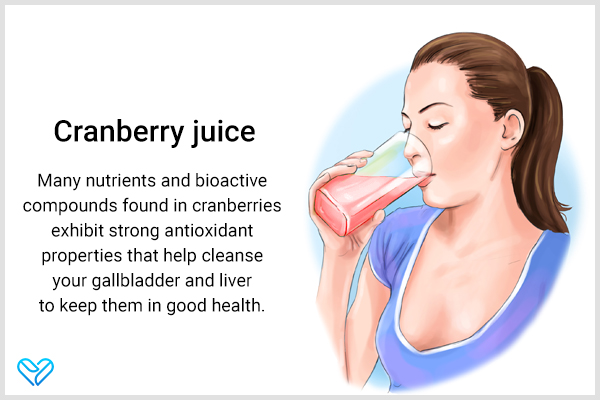
Many nutrients and bioactive compounds found in cranberries exhibit strong antioxidant properties that help cleanse the gallbladder and liver to keep them in good health. (4)
Cranberry juice is replete with dietary fiber, which binds excess cholesterol and eliminates it from the body, thereby reducing the formation of cholesterol gallstones. Plus, it contains malic acid, which may help dissolve existing gallstones.
How to use:
Drink 1 glass of cranberry juice daily. You may dilute it with water if you feel very acidic.
4. Sip dandelion tea
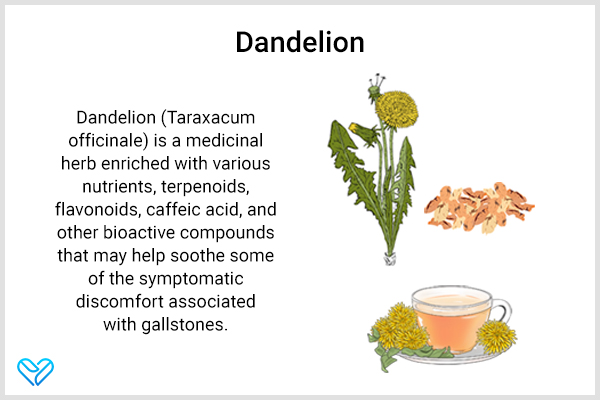
Dandelion (Taraxacum officinale) is a medicinal herb rich in various nutrients, terpenoids, flavonoids, caffeic acid, and other bioactive compounds that may help soothe some of the symptomatic discomfort associated with gallstones.
It is also used as a diuretic to increase urine output, which may help flush out toxins from the liver and gallbladder and thus reduce the formation of gallstones. (5)(6)
How to use:
- Put 1 teaspoon of dried dandelion root in a cup of hot water.
- Put a lid on the cup and let the herb steep in the water for 10 minutes.
- Strain the liquid and mix in some honey to taste.
- Drink this tea 2–3 times daily for 1–2 weeks.
Note: People with diabetes should avoid dandelion.
5. Try milk thistle
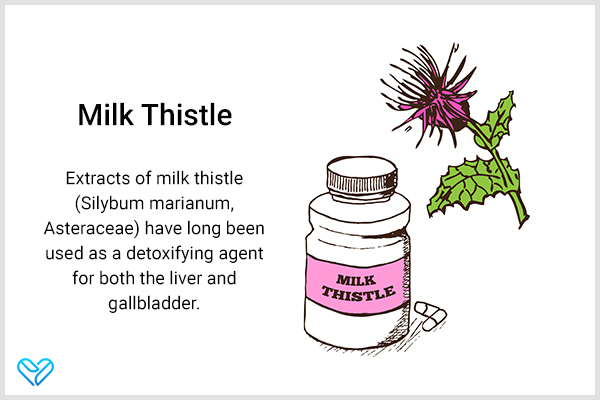
Extracts of milk thistle (Silybum marianum, Asteraceae) have long been used as a detoxifying agent for both the liver and gallbladder. It is known to induce the contraction of both these organs, which helps expel bile and gallstones.
Silymarin is the main active constituent of milk thistle and is essentially a collection of bioflavonoids or flavonolignans. (7)
Silymarin may help lower biliary cholesterol and dilute the consistency of bile, thus preventing gallstones. It is also credited with anti-inflammatory properties that may help ease the pain and discomfort associated with this condition.
How to use:
- Put 1 tablespoon of crushed or finely ground milk thistle seeds in 3 cups of water and boil. Turn off the heat and let it steep for 20 minutes. Strain the tea, add honey to taste, and drink it 2–3 times a day for 1 week.
- Add this herb to salads and other natural juices.
- Take milk thistle in supplement form but only after consulting your doctor.
Note: Oral intake of milk thistle in the recommended dosage is considered relatively safe, but it can trigger some side effects such as nausea, indigestion, diarrhea, intestinal gas, and loss of appetite. The following people should not take milk thistle without consulting their doctor first:
- Pregnant and breastfeeding women
- Children
- People with diabetes
- Those taking medications
6. Use Lysimachiae Herba
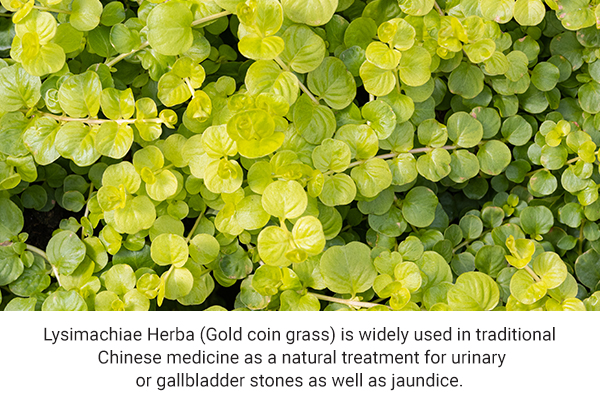
Lysimachiae Herba (gold coin grass) is widely used in traditional Chinese medicine as a natural treatment for urinary or gallbladder stones as well as jaundice.
This herb has potent antioxidant and anti-inflammatory properties that are particularly effective against cholesterol gallstones. (8) It may help soften the gallstones so that they dissolve easily and become easier to pass via stool.
7. Try artichoke
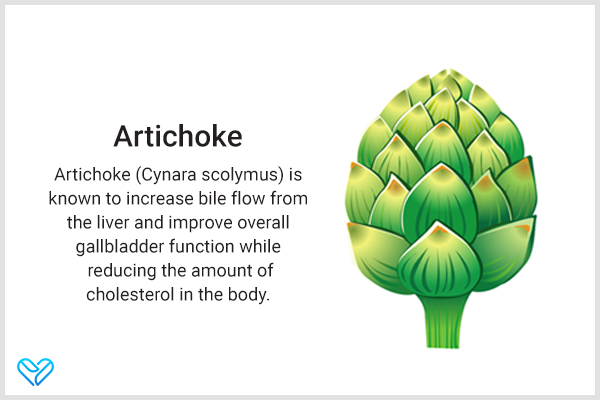
Artichoke (Cynara scolymus) is known to increase bile flow from the liver and improve overall gallbladder function while reducing the amount of cholesterol in the body. All these effects may indirectly reduce the formation of gallstones.
However, more research is needed to establish artichoke as an effective remedy for this condition. (9)(10) Moreover, if a gallstone gets stuck in the bile duct, this remedy can actually end up worsening the condition by stimulating an increased production of bile that doesn’t have an outlet.
8. Consume psyllium
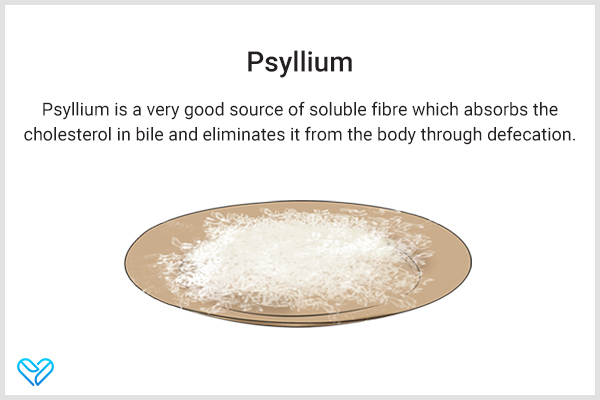
Psyllium is a very good source of soluble fiber, which absorbs the cholesterol in bile and eliminates it from the body through defecation. The reduction in biliary cholesterol, in turn, reduces the risk of gallstone formation. (11)
Thus, high intake of dietary fiber is linked to decreased incidence of gallstones. (12)
How to use:
- Add 1 tablespoon of psyllium powder to a glass of water.
- Mix well and drink it 2 times a day.
- Repeat daily until your gallstones are gone.
Lifestyle Changes to Prevent and Treat Gallstones
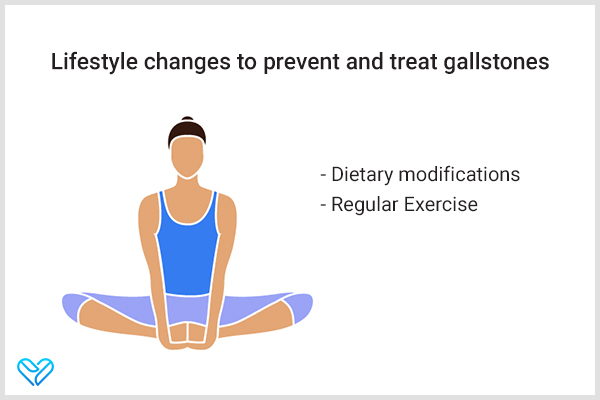
1. Dietary modifications
Here are a few dietary tips to reduce the risk of gallstones:
- Consume more fibrous foods such as fruits, vegetables, and whole grains.
- Up your intake of fish and nuts.
- Consume healthy fats such as fish oil, olive oil, and vegetable oil.
- Limit your intake of refined carbohydrates and sugar as well as salty and fried foods. (13)
- Avoid unhealthy or hydrogenated fats, which include cholesterol, saturated fat, and trans fatty acids. (14)
- Reduce your consumption of dairy products, red meat, and alcohol.
2. Regular exercise
Physical activity can help promote better digestion and reduce the risk of gallstones. Aim for at least 30 minutes of moderate-intensity exercise per day. (14)
Ayurveda and yoga are alternative therapies that have been found useful in the management of gallstones without any side effects. (15)
Most-Asked Questions About Gallstones
What are the complications of gallstones?
Complications of gallstones can include:
- Gallstones may get stuck inside the duct that releases bile from the gallbladder into the small intestine. This blockage causes pain and inflammation in the gallbladder, which is known as cholecystitis.
- Gallstones can also render your gallbladder, bile ducts, or liver severely damaged or infected.
- Gallstones may move inside the pancreatic duct and block it, triggering pain and swelling within the pancreas, which is known as gallstone pancreatitis.
What foods can trigger a gallbladder attack?
Foods, such as fatty foods, fried foods, processed foods, dairy products, and eggs, may cause stronger gallbladder contractions than others. If there are gallstones in the bladder, these foods are more likely to trigger a gallbladder attack.
Can I take ibuprofen for gallbladder pain?
Over-the-counter NSAIDs such as ibuprofen may help with minor gallbladder pain, but you will generally need prescription-strength analgesics to manage the acute pain that occurs when a gallstone gets stuck in the cystic/bile duct or passes through it.
If the pain is too intense, you may need a combination of antispasmodics such as hyoscine butylbromide and painkillers such as diclofenac sodium, which can be administered in injectable form at any hospital or dispensary.
What happens if I do not get treatment for gallstones?
If gallstones are left untreated, they may pass into the bile duct and block it for a prolonged period. Due to this blockage, the gallbladder will be unable to release bile into the small intestine. The continuous buildup of bile in the gallbladder will cause inflammation (cholecystitis) and even infection.
The most characteristic symptom of cholecystitis is the sudden onset of intense pain in the upper-right side of the abdomen, usually late at night. The inflamed gallbladder can eventually rupture, which can be fatal.
In some cases, the gallstone may pass into and obstruct the common bile duct, which drains digestive fluid from both the liver and gallbladder. This requires emergency surgery since the inability of the liver to expel bile can damage it permanently.
Most surgery books mention the “5Fs” as criteria for diagnosing cholelithiasis. Any patient who comes to the doctor with upper abdominal pain and meets the following 5Fs profile is most likely suffering from gallstones:
- Fair
- Fat
- Female
- Fertile
- Forty
Final Word
Gallstones are fairly common but don’t always present symptoms and may dissolve on their own. However, if these stones block or pass through the bile duct and cause severe pain along with other symptoms, it is important to seek proper medical treatment.
The above-listed remedies mainly aim at preventing the formation of new gallstones rather than treating the existing ones. They may also help ease some of the symptomatic distress, but it’s best to consult your doctor before trying them.
 Continue ReadingGallstones: Causes, Symptoms, Treatment, and More
Continue ReadingGallstones: Causes, Symptoms, Treatment, and More
- Was this article helpful?
- YES, THANKS!NOT REALLY


